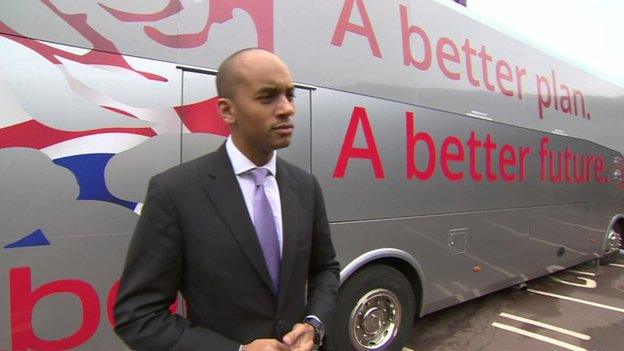Reality Check: Does Labour need to cut spending?
- Published

There has been a certain amount of confusion today about Labour's approach to borrowing.
It started with the party's leader in Scotland, Jim Murphy, saying that the party would not need to make "further cuts to achieve our spending rules" in the next parliament.
Then, shadow chancellor Ed Balls appeared to contradict that on the Today programme on BBC Radio 4, and Ed Miliband, in his speech launching the Labour manifesto, clearly ruled out a policy of having no cuts at all in departmental spending after 2016.
The confusion arises from the different promises the parties are making. The Conservatives have said that by the end of the next parliament they will be raising more money than they spend on anything. Labour is undertaking to eliminate the current deficit by the end of the next parliament, which means only borrowing to invest.
The confusion grows further because the Labour manifesto says: "We will get national debt falling and a surplus on the current budget as soon as possible in the next Parliament."
If Labour is still borrowing to invest then the national debt will not be falling - it will be rising. The party probably means that the total debt will be falling as a proportion of the total amount produced by the economy, but it does not say that.
The next question, which was posed by many journalists at the manifesto launch, is how soon will the current deficit be eliminated.
This is crucial, because the Institute for Fiscal Studies agrees with Jim Murphy that if the current deficit is not to be eliminated until 2020 then there is no need for further cuts.
Mr Murphy is right that no further cuts are needed to meet the fiscal target, but the party leadership plans to make them anyway.
Mr Miliband and Mr Balls say the current deficit will be eliminated "as soon as possible" so there will have to be extra cuts. We don't know how severe those cuts will be because we do not know how soon a Labour government would try to get rid of it.
It may be that a Labour government would pursue a radical anti-austerity policy as Jim Murphy suggests, or it could be that it would make more severe cuts than the Tories - we just don't know.
In an interview with the BBC News Channel, shadow business secretary Chuka Umunna said that Labour may not need to borrow to invest at all, which would bring its borrowing pledge into line with the Conservative one. But he did not go quite that far.
"There are no commitments in this manifesto that entail additional borrowing - that includes capital commitments," he said.
So it sounds like the new policy is only to borrow to fund investment schemes that do not appear in the 2015 manifesto - and that's an unusual-sounding borrowing pledge.

Election 2015 - Reality Check

What's the truth behind the politicians' claims on the campaign trail? Our experts investigate the facts, and wider stories, behind the soundbites.
Read latest updates or follow us on Twitter @BBCRealityCheck, external
